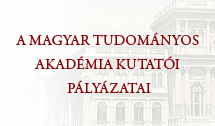A Tudománytörténet és Tudományfilozófia Kutatócsoport szeretettel meghív minden érdeklődőt Dr. Stefan Heßbrüggen-Walter (Higher School of Economics, Moscow) szeptember 18-án, délután 17 órától tartandó, "Answering the Newtonian Challenge: Lambert, Tetens, and Kant on the Reform of Metaphysics" című előadására.
Kovács Dávid Márk előadása
A Tudománytörténet és Tudományfilozófia Kutatócsoport szeretettel meghív minden érdeklődőt Kovács Dávid Márk (Cornell University) augusztus 10-én délután 16 órától tartandó, "Metaphysical Explanation and Expressive Power" című előadására.
Pat Bondy előadása
A Tudománytörténet és Tudományfilozófia Kutatócsoport szeretettel meghív minden érdeklődőt Dr. Pat Bondy (Cornell University) július 27-én délután 16 órától tartandó, "Virtues, Evidence, and Ad Hominem Arguments" című előadására.
Ruth Lorand előadása
A Tudománytörténet és Tudományfilozófia Kutatócsoport szeretettel meghív minden érdeklődőt Prof. Ruth Lorand (University of Haifa) június 16-án délután 16 órától tartandó, "Types of Disorder" című előadására.
Roland Poellinger előadása
A Tudománytörténet és Tudományfilozófia Kutatócsoport szeretettel meghív minden érdeklődőt Roland Poellinger (Munich Center for Mathematical Philosophy, LMU Munich) május 5-én délután 16 órától tartandó, "The Problem of Mental Causation in Non-Markovian Network Models" című előadására.
Abstract:
Listing The Non-Reductivist’s Troubles with Mental Causation (1993) Jaegwon Kim suggested that the only remaining alternatives are the eliminativist’s standpoint or plain denial of the mind’s causal powers if we want to uphold the closure of the physical and reject causal overdetermination at the same time. Nevertheless, explaining stock market trends by referring to investors’ fear of loss is a very familiar example of attributing reality to both domains and acknowledging the mind’s interaction with the world: “if you pick a physical event and trace its causal ancestry or posterity, you may run into mental events” (Kim 1993). In this talk I will use the formal framework of Bayes net causal models in an interventionist understanding (as devised, e.g., by Judea Pearl in Causality, 2000) to make the concept of causal influence precise. Investigating structurally similar cases of conflicting causal intuitions will motivate a non-Markovian, yet natural extension of the interventionist Bayes net framework, Causal Knowledge Patterns, in which our intuition that the mind makes a difference finds an expression.



